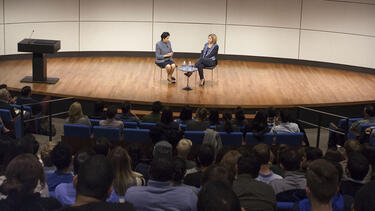Alumni
Renewable Energy Is Easier Than Ever to Build—and Harder to Talk About
Advances in technology and a maturing development ecosystem have made renewable energy more economical, less risky, and increasingly rewarding for landowners, says Reid Buckley ’89, a partner at Orion Renewable Energy Group. But it has also become more politicized.

What’s the Future of Television?
With traditional TV losing viewers to streaming services, the industry is still figuring out what its new economic model will look like.

Can a Positive Impact Be Profitable?
PepsiCo CEO Indra Nooyi ’80 talks about the company’s Performance with Purpose initiative and the evolving role of sustainability.

Can Tech Make the World Better?
Katie Rae ’97, who runs an incubator and an investment firm, on finding the next great startup.
What Do Small Businesses Need?
Small businesses create jobs, so how do we help them grow? Entrepreneur and investor Sean Greene ’90 points to better government policies and access to capital

Where are the Opportunities for Investment in Healthcare?
Dr. Stephen Knight ’90, president and managing partner of the healthcare-focused venture capital firm F-Prime Capital Partners, talks to Yale Insights about how the company evaluates startups—and why launching a company yourself is sometimes the most profitable route.

Are We Making Progress in Addressing Humanitarian Crises?
Mercy Corps CEO Neal Keny-Guyer ’82 discusses the challenges of addressing the world’s worst humanitarian crises—and where he finds hope.

Can You Reinvent an Iconic Brand?
James Firestone ’78, president of corporate strategy and Asia operations for Xerox, talks about building a new business out of an iconic brand.

Can We Create Affordable Housing in the World’s Fastest-Growing Cities?
Ira Peppercorn ’85 says that creating affordable housing in the world’s fastest-growing cities requires accurate data and an incremental approach.
How Do You Create the Space for Creativity?
Amy Whitaker ’01 on how organizations and individuals can maximize creativity while controlling risk.

What Makes a Museum Successful?
Daniel Weiss ’85, president of the Met, discusses the challenges of changing with the times while preserving the past.
